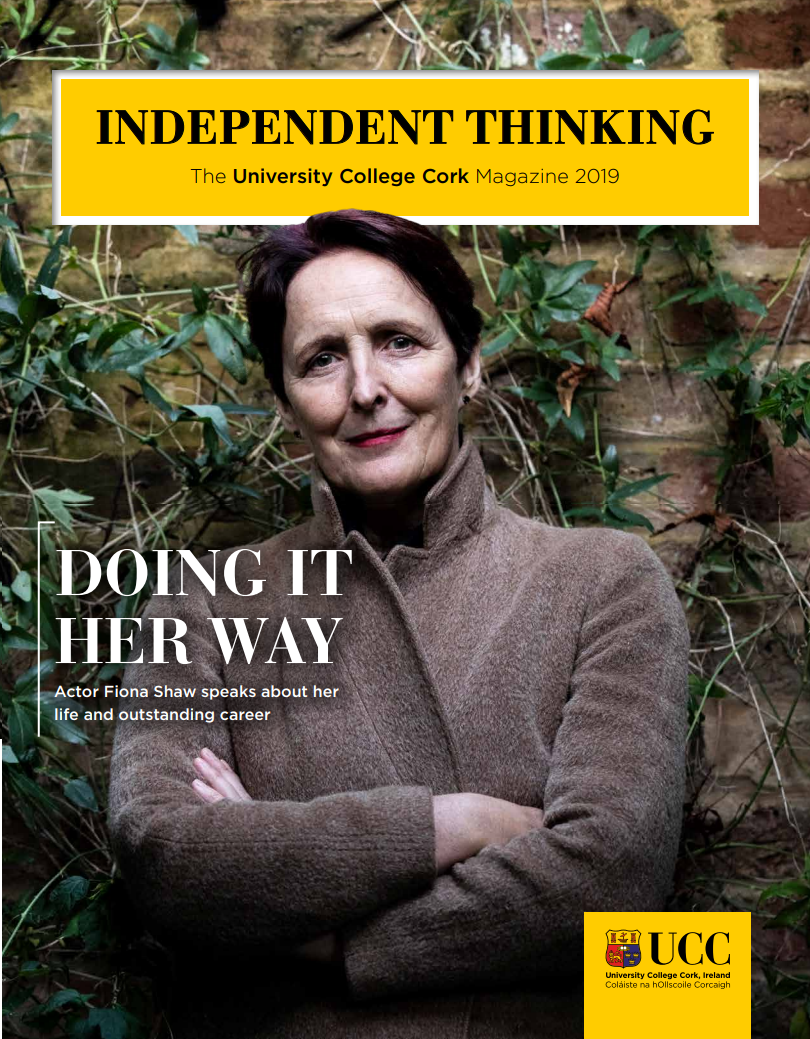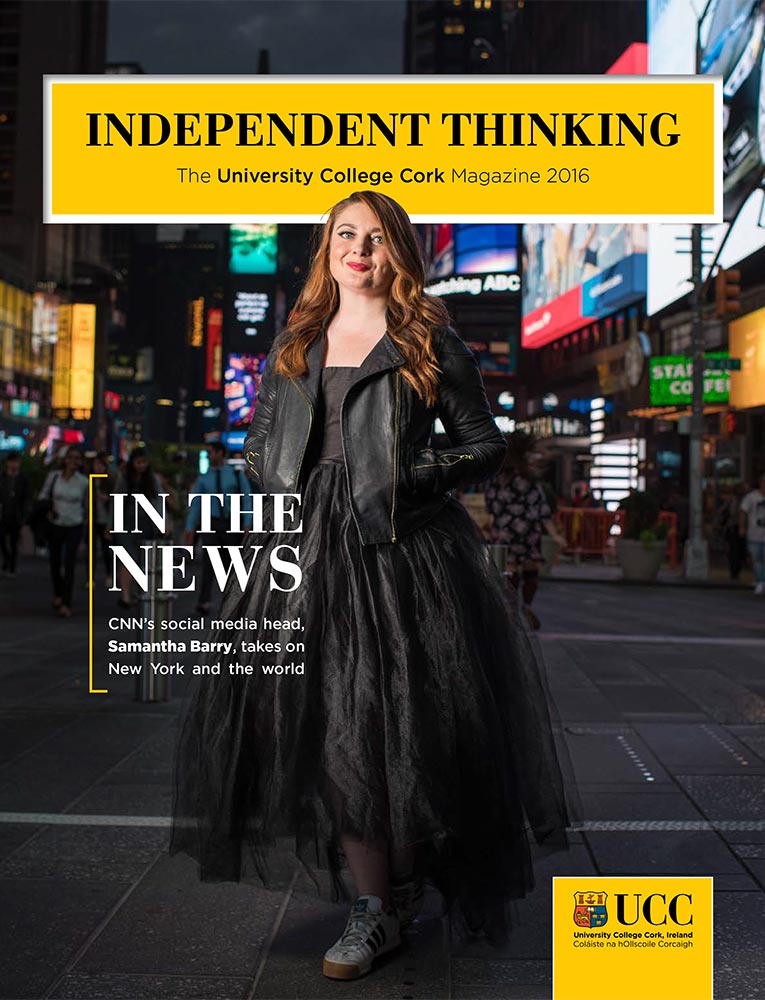Features
- President's Welcome
- Breaking News and Shattering Ceilings
- The Future Is Bright
- Her Next Act
- Márta: Mí na Féile Pádraig
- Bucking Convention: the Rising Power of Youth Climate Activism
- Opinion: Parenting Between Two Cultures
- Sigerson Glory for the Skull-and-Crossbones
- Analogue Love Stories
- Self-Care to Sustainability: the PG Expo Returns to Campus
The Future Is Bright
The launch of Securing Our Future: UCC Strategic Plan 2023 – 2028 marks an exciting new chapter for University College Cork. UCC President Professor John O’Halloran shares key insights into an ambitious strategy which is focused on ‘people and planet’. In conversation with Jane Haynes
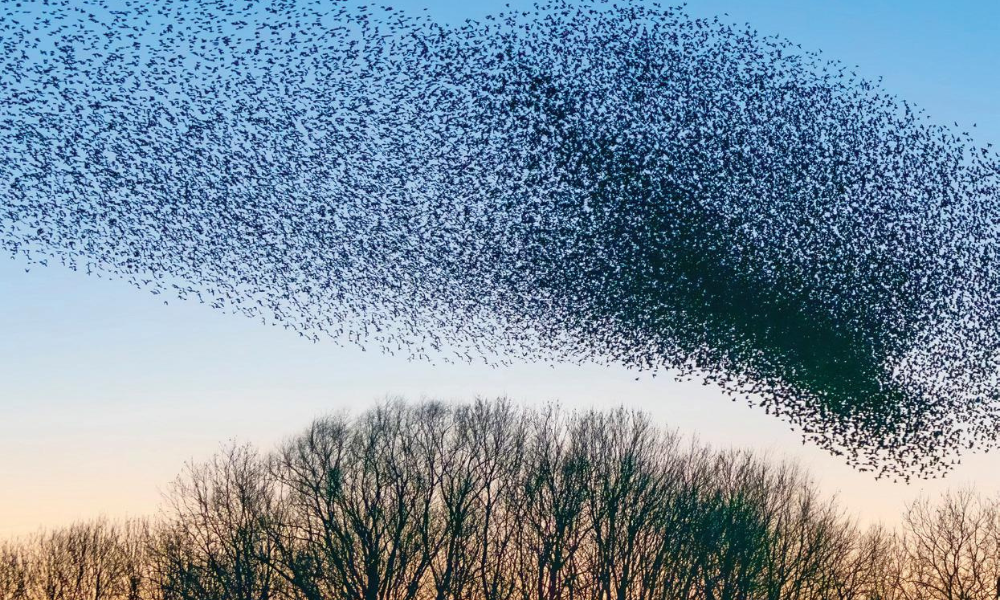
Almost three years to the day when UCC began its pivot to an online and blended learning, teaching, research and service delivery in line with the COVID-19 health and safety measures, and having steered the university through the most challenging period in its history, UCC President Professor John O’Halloran is reflective as he discusses leading the institution to its next exciting phase: the implementation of Securing Our Future: UCC Strategic Plan 2023 – 2028.
President O’Halloran’s personal signature is imprinted across this ambitious plan, from the sharp focus on sustainability to the eye-catching motif of a starling murmuration. The latter, he says, was inspired not only by his background as an ecologist and ornithologist but also the metaphor of these agile birds coming together to function as a collective.
‘The idea was to describe what we are trying to do – the individual is really important in any organisation but, most importantly, when we act in the collective, we can do some extraordinary things,’ he explains.
‘The interesting thing about the murmuration is that it is agile and organic, and derives its strength from collective curiosity, trust and collaboration as it responds to change. It seemed, to me, a really appropriate metaphor to help us to articulate what I believe is the collective strength of our institution.’
Underpinning the strategy are the university’s core values: Compassion, Agility, Integrity, Respect, Discovery, Equity, Accountability and Sustainability – captured thoughtfully by the mnemonic ‘CAIRDEAS’, which is the Irish word for ‘friendship’. These values, Professor O’Halloran says, will be at the heart of the institution’s decision-making as it strives to secure the future for our people, planet and university:
‘These values, I hope, will be a beacon for us, and using CAIRDEAS as a mnemonic will help us prioritise those relationships with each other, with other institutions, and with other countries.’
People – and their lived experiences as students and staff within the university community – are at the heart of this strategy, from supporting cutting-edge research activity and providing life-wide, connected education to putting the appropriate structures in place to support mental health and wellbeing.
‘This is about making sure that we support our people in transitioning into the university as either students or staff: how do we support people to grow to their full potential when they are here, and then, how do we transition people out in a way that is meaningful for them in their lives,’ says Professor O’Halloran.
The strategy aims to further develop and embed the very successful Connected Curriculum framework for students, ensuring a learning experience which is built on existing strengths and best practice globally, and is connected and meaningful to the world they will enter. The Connected Curriculum framework consists of six components: research-based teaching, employability, sustainability, inter- and trans-disciplinarity, global reach, and civic and community engagement.
‘Every programme will be aligned with the Connected Curriculum framework, and our students will be able to see, through our curriculum management system, what they have learned about the subject area through research-based teaching, but also, how to ensure they are globally orientated, how their employability is prioritised, and their education can contribute to a sustainable future,’ explains Professor O’Halloran.
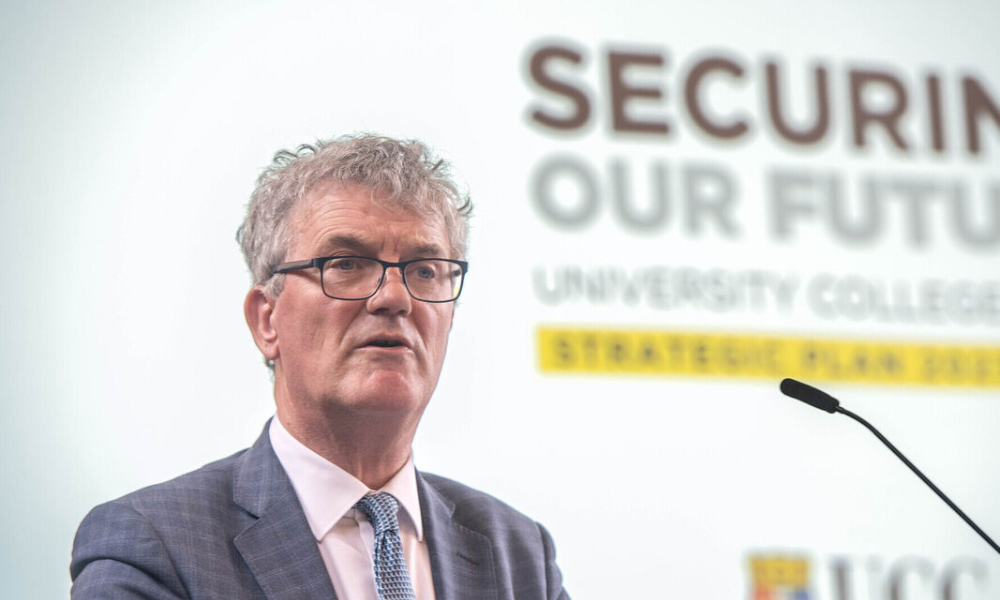
Striving for, and building upon excellence is a key feature of the strategy, as evidenced by exciting developments in the realm of Sustainability and Climate Change in close alignment with the United Nations Sustainable Development Goals (SDGs).
UCC is globally acknowledged and ranked as a leader in sustainability and environmental issues. The first university in the world to be awarded a Green Flag from the Foundation for Environmental Education, we are also the world’s first Green Campus, and the seventh most sustainable university in the world and the first in Ireland. As an eminent research ecologist, a driving force behind UCC’s leadership in sustainability, and co-chair and founder of the Green Forum, Professor O’Halloran is uniquely positioned to lead the university through to the next important phase.
‘I felt, as President, given the importance of this issue to me, personally, but also, to our future, that we would establish a dedicated Office of Sustainability and Climate Action,’ he explains.
‘We have appointed the first Associate Vice President for Sustainability, Professor Brian Ó Gallachóir, and his role and responsibility will be to ensure that the research faculty and those devising the curriculum will all work closely together, to deliver on the university’s plans to consolidate its role as a leading university of sustainability.
‘Dr Maria Kirrane, who has just been appointed Head of Sustainability, will lead the new Office to ensure we get the connection between the operations of the institution, cutting edge research and our learning and teaching. This new Office will serve as the intersection point between the research and the practice.
‘Another important element is to ensure that we are connected outside of our own university, and we have recently delivered two major projects. One, is the United Nations COP26 and COP27, where UCC was the only Irish university that had formal representation, in observer status. Secondly, two weeks ago, we launched the United Nations Sustainable Solutions Network in partnership with Queens University Belfast, which is an all-Ireland network connected directly into the United Nations to support the delivery of the SDGs.’
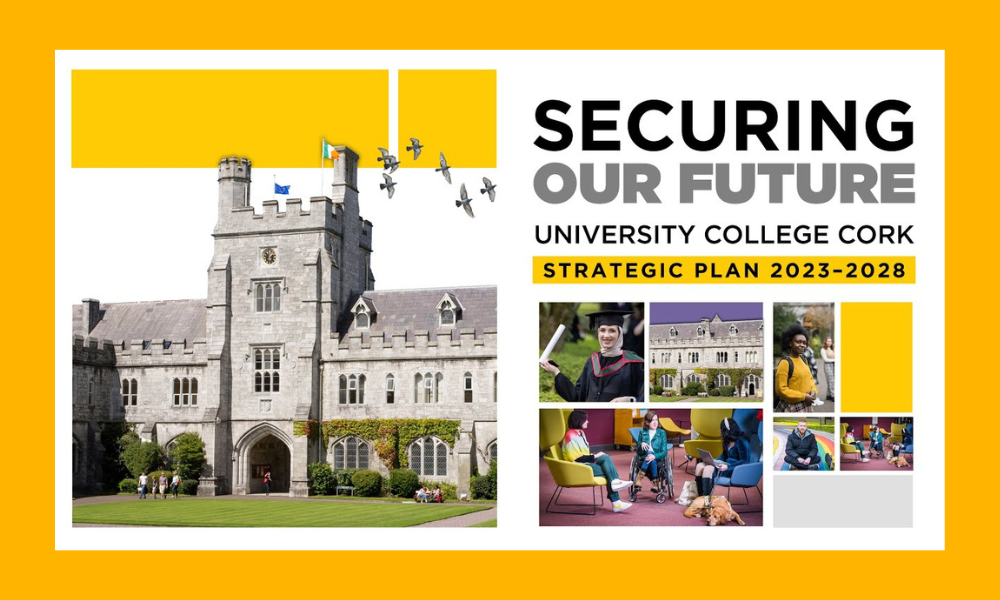
The strategy’s overarching research strand is just as ambitious and innovative, driven primarily through UCC Futures, an initiative designed to bring together a critical mass of our researchers in each of ten thematic areas so that that we build scale and operation, while still providing support to individual researchers.
‘What we are aiming to do is make sure that we will be a university recognised for particular niche areas of research excellence, and we believe that the way we can do that is by supporting those scholars who can truly excel,’ says Professor O’Halloran.
Currently, UCC Futures is focused on 10 key areas of research: Food, Microbiome and Health; Future Humanities; Sustainability; Future Medicines; Collective Social Futures; Quantum and Photonics; Pharmaceuticals; Artificial Intelligence and Data Analytics; Children; and Future Ageing and Brain Science.
The initiative, which launched in December 2021, has been met with great enthusiasm so far, Professor O’Halloran says: ‘Our stakeholders and government departments have really engaged with this, as have our students – who can be confident they will be coming to a centre of excellence.’
You can view and download Securing Our Future: UCC Strategic Plan 2023 – 2028 through this link.

